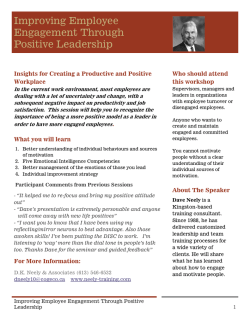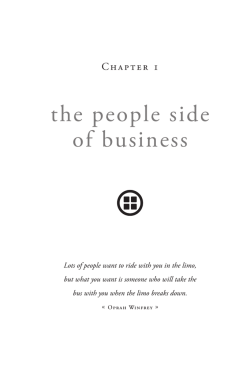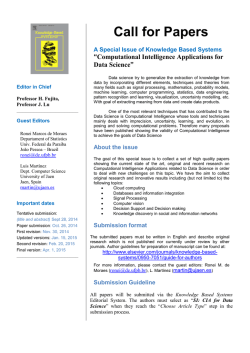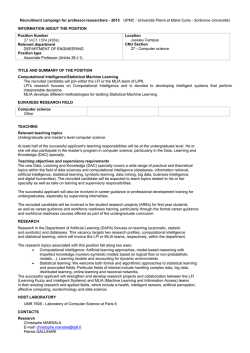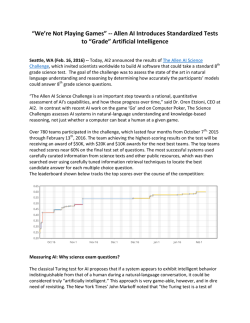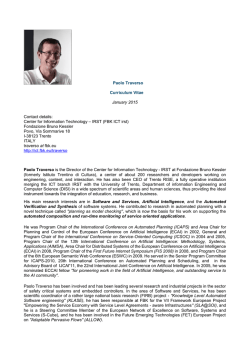
Emotional Intelligence
CONTENTS What is IQ? Importance of Emotions What is EQ? High EQ vs. Low EQ Ingredients of EQ Uses of EQ Test your EQ Enhance your EQ Why EQ is more then IQ INTELLIGENCE RATIONAL/ IQ IQ is about analytical, rational and comprehension skills and is related mostly to leftbrain activities. EMOTIONAL/ EQ EQ is being dynamically aware of ones own emotions and ability to recognize the emotions of others and use these emotions for constructive purposes. EQ can be learnt at any age, but IQ saturates at the age of about 18- 20 IMPORTANCE OF EMOTIONS ¢ Survival ¢ Decision -making ¢ Boundary setting ¢ Communication ¢ Unity WHAT IS EQ? “A type of social intelligence that involves the ability to monitor one's own and others' emotions, to discriminate among them, and to use the information to guide one's thinking and actions" EQ- THE HISTORY Fairly new concept in scientific community Has roots in the concept of social intelligence," first identified by E.L. Thorndike in 1920 Pioneer – Daniel Goleman, Professor of Psychology at the Harvard University through his book “Emotional intelligence” Phrase “ Emotional Intelligence” coined by Yale psychologist Peter Salovey and the University of New Hampshire’s John Mayer FACTORS ON WHICH EQ RELIES • Knowing one’s feelings and using them to make life decisions • Being able to manage one’s emotional life without being hijacked by it • Persisting in the face of setbacks • Channeling one’s impulses in order to pursue their goals • Empathy • Handling feelings in relationships with skill and harmony HIGH EQ Vs LOW EQ 1. Label their feelings, rather than "I feel impatient." vs. "This is ridiculous" labelling people or situations. "I feel hurt and bitter". vs. "You are an insensitive jerk." "I feel afraid." vs. "You are driving like a idiot." 2. Distinguish between thoughts and Thoughts: I feel like ... & I feel as if... & 1 feelings. feel that Feelings: I feel: (feeling word) 3. Take responsibility for their feelings. "I feel jealous." vs. "You are making me jealous"' 4. Use their feelings to help them make "How will I feel if I do this?" "How will I feel decisions. if I don’t" 5. Show respect for other people's They ask "How will you feel if I do this?" feelings "How Will you feel if I don't." Contd... 6. Feel energized, not angry. They use what others call "anger" to help them feel energized to take productive action. 7. Validate other people's feelings. They show empathy, understanding, and acceptance of other people's feelings. 8. Practice getting a positive value from They ask themselves: "How do I feel?" their negative emotions. and "What would help me feel better?" They ask others "How do you feel?" and "What would help you feel better?" 9. Don't advise, command, control, They realize it doesn't feel good to be on criticize, judge or lecture to others the receiving end of such behavior, so they avoid it. 10. Avoid people who invalidate them, or As much as possible, they choose to don't respect their feelings. associate only with bother people with high EQ. Emotional Intelligence Intrapersonal Intelligence Self awareness Self management Self motivation Interpersonal Intelligence Social awareness Social competence SELF - AWARENESS Emotional Awareness Accurate self- assessment SELF - MANAGEMENT Self - confidence Self - control Trustworthiness SELF -MOTIVATION Achievement drive Commitment Initiative Optimism Conscientiousness Adaptability Innovation SOCIAL AWARENESS Influence Communication Conflict Management SOCIAL COMPETENCE Understanding others Developing others Leadership Service orientation Change catalyst Leveraging diversity Building bonds Political awareness Team capabilities Collaboration and co operation USES OF EQ Recruitment Predicting Performance Negotiation Performance Management Peer Relationships Enhancing EQ Control the way to use your physical body Physical Movements Breathing Facial Expressions Diet Control your mental focus Why EQ matter more than IQ Characters RI / EI • Goal setting • 30/70 • Decision-Making • 50/50 • Team Work • 40/60 • Communication • 10/90 • Time Management • 30/70 • Motivation & Inspiration • 05/95 “Ghazal mein bandish-e-alfaz hi nahin Kafi …..Zigar ka Khun bhi Kuchh Chahiye asar ke liye”
© Copyright 2026
